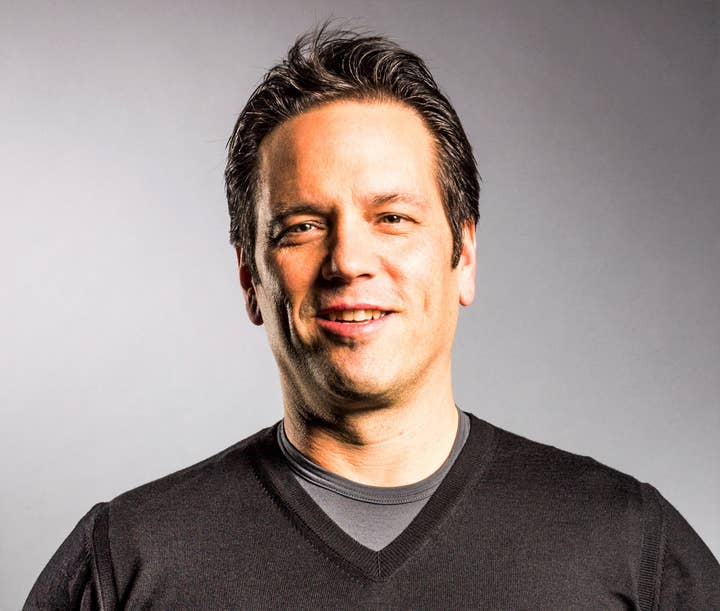People of the Year 2018: Phil Spencer
PlayStation may have dominated the charts, but it was Xbox that got the games industry talking
Cold hard numbers will tell you that 2018 was not the start of the Xbox comeback.
There were some good games, certainly. And Xbox One X established itself as a great console.
But whether you're looking at Metacritic or the sales charts, the last 12 months has proceeded in much the same as the previous four years -- a generation entirely dominated by PlayStation.
Yet here we are, days away from bidding farewell to 2018, and it's Phil Spencer -- the leader of Microsoft's gaming business -- who is among our people of the year. Because the numbers hide the fact that this was a year where Xbox changed the rhetoric around its business. It was only a few years ago when Microsoft was closing studios and its hardware was suffering unfavourable comparisons to the competition. Xbox, so the story went, was out of touch and out of ideas.
Now, at the close of 2018, opinions are beginning to shift.

"It has been a transformational year for Xbox on many fronts," says Spencer. "We advanced our position with Xbox Game Pass by making our first-party content available in the service at launch, and added seven studios to Microsoft Studios, bringing new talent and new perspective. I'm incredibly proud of the team for delivering the Xbox Adaptive Controller to make gaming accessible to people with limited mobility and also our vision to make gaming accessible in new ways to more people with Project xCloud. With that said, we have much we want to accomplish and our entire team is excited about the year ahead."
The Xbox strategy was made clear this year. As Nintendo focused on Super Smash Bros, and Sony ran out of things to announce, Microsoft used the opportunity to set out its vision for the next generation, and that vision is big, multi-faceted and hugely ambitious. It involves subscription services, streaming technology, multiple consoles, mobile, development services, PC ecosystems and even community platforms.
Some of these areas require exclusive content to succeed, and far from relying on third parties to do the heavy lifting, Xbox opened its wallet and acquired a string of established studios, including Playground Games, Ninja Theory, Compulsion Games, Undead Labs, Obsidian and InXile. The company has also built another development team called The Initiative.
This investment ends the speculation that Microsoft just isn't that serious about games (which is now a $10 billion business within the tech giant). And although it has spent big in games before, such as when it acquired Rare in 2002 and Mojang in 2014, these latest acquisitions are not opportunistic moves to add established IP, but strategic plays designed to build a 'pipeline' of content into Xbox Game Pass.
"The future of gaming is the ability to play the games you want, with the people you want, whenever you want, wherever you are, and on any device."
"Our goal with Xbox Game Pass is to deliver a curated catalog of titles across many different genres, so there is always something new to play," Spencer says about the firm's subscription ambitions.
"It's been awesome to watch the impact that Xbox Game Pass has had on both players and developers. Xbox Game Pass members play 40 per cent more games than they did before they joined. They discover new genres, new franchises, new storylines -- games they would not have played. Games get six times the number of monthly players after entering Xbox Game Pass. The service is helping create and sustain player communities for multiplayer titles and single player games, which make up nearly half of the most played games in the service."
Project xCloud, the streaming service that Microsoft announced in October this year, appears to be the missing jigsaw piece that takes Game Pass from being an attractive offer for current Xbox and PC gamers, to a subscription platform that the whole world can access.
This is the biggest uncertainty around what Xbox is doing. Streaming is still a tiny business in video games, accounting for very little revenue (most of it coming from the largely forgotten PlayStation Now service), and there are some publishers cautious over its potential. Nevertheless, Microsoft -- along with the likes of Google -- clearly believe in it.
"The future of gaming is the ability to play the games you want, with the people you want, whenever you want, wherever you are, and on any device," Spencer recites. "Project xCloud is about providing more access and choice to gamers. For mobile-only players, it creates access to more immersive games that they haven't had access to before. For console and PC players, it creates new choice in when and where they can play. And, for developers, it means the opportunity to create one game that has the potential to scale to billions of players. We're building a set of tools and technologies that we believe can empower the entire industry."
This isn't quite waving the white flag on the hardware business. There will still be Xbox consoles in the future. Although Spencer doesn't rule out the possibility of Game Pass appearing on what some people would consider competitive hardware.
"When we think about the growth and potential for gaming at Microsoft, we always start with the player," he tells us. "There are more than two billion people on the planet playing video games -- some on our console, others on PC, a lot of people on mobile. We'll continue to put those players at the centre of every decision we make -- giving them access to the games they want to play, with the people and community they want to play with, on the device they choose."
"We'll continue to put those players at the centre of every decision we make -- giving them access to the games they want to play, with the people and community they want to play with, on the device they choose."
To credit Spencer entirely for the Xbox vision would do a disservice to the team that surrounds him, but it's apparent he is held in high regard by his colleagues. Whenever we speak to anyone from Xbox, whether it's a designer at Rare or a marketing executive in Europe, there is huge admiration for what Spencer has done so far.
But the crucial element isn't the backing of his own teams, but the support of the wider Microsoft business. Spencer tells us that Microsoft CEO Satya Nadella is his biggest career inspiration: "His enthusiasm for learning about the power and potential of gaming and the freedom he's given us to chart a path to make a difference, for all gamers, has been inspiring," he explains.
Spencer was added to Microsoft's senior leadership team in September 2017 and reports directly to Nadella. And you can already see the impact of that promotion on the Xbox business.
"It's less about my promotion and more that gaming is now a core priority for Microsoft," Spencer disagrees. "With the support of Satya, Amy Hood our CFO and the broader senior leadership at Microsoft, we're empowered to apply resources and expertise, from across the company, to deliver incredible gaming experiences for the world's more than two billion gamers."
That's the second time Spencer dropped the 'two billion' number in our interview (and there's a third coming up). How big really is the console gaming audience? 180 million people, maybe, if we're lucky? But the number of gamers is estimated at around two billion. Microsoft wants to reach as many of them as it can, whether it's through in-game technology services, streaming platforms, consoles, Mixer, Minecraft or mobile.
Yet it's not just about reaching a massive audience, it's about reaching every audience. The new Adaptive Controller (which we've already praised separately in our end-of-year articles) isn't just some smart PR move and a tick in the company's Corporate Social Responsibility column, it actually fits with this Xbox business strategy. Making its games more accessible doesn't just mean putting them on more platforms.
"There have been so many amazing moments as I look back over the past year but I think it would have to be watching the Microsoft holiday campaign come together and learning Owen's story," says Spencer, referring to the firm's Christmas advertising featuring its newly developed controller. "Owen is a real person and a real gamer. To hear the story of him, his family and his friends -- It's what makes this industry and art form so great. The campaign carries the line, 'when everybody plays, we all win,' and we firmly believe that."
He continues: "As we look forward there is still much we can do as an industry to ensure we are making gaming accessible, inclusive, safe and fun for the two billion gamers on the planet today and the next two billion."

Of course, as we stated at the start, 2018 wasn't the year of Xbox. And 2019 and 2020 won't necessarily be, either. Spencer and his team still have it all to prove. Will xCloud actually work? Can Game Pass maintain that momentum? Will these new studios create content fast enough and at the required quality? Can Mixer become a sizeable video platform? Will Microsoft do what's needed to improve its PC games service?
On that last point, Spencer suggests there might be some promising developments in the year ahead.
"[2019] will be a great year for games," he says. "I'm excited for what we have coming including Crackdown 3, Ori and the Will of the Wisps and Gears 5 as well as the incredible line-up of games from the industry that will look and play best on Xbox One. While we continue to advance our position on the console, you'll see Xbox show up in more ways to gamers on all devices.
"For example, and as I've said before, we feel we can play a bigger role delivering for PC gamers on Windows. We haven't always had great focus or consistency with our approach to gamers on the PC. The PC gaming ecosystem is incredibly vibrant and successful so it starts with us asking ourselves what role we can play and what we can add for both gamers and developers."
So it's all still to prove, but regardless, 2018 was a year when Phil Spencer got the world excited about Xbox again. And considering how this generation started, that's no small feat.
As our chat drew to an end, we asked Spencer who he would have named as his person of the year.
"Stan Lee," he says. "The characters, stories and worlds he created have been a fundamental part of the majority of my life and they will continue to live with and inspire me as well as others for generations to come. Stan's passing really made me think about all the great times I've had reading or watching the worlds he created over the years."
